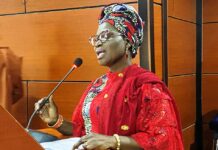In its response to the reactions and uproar the recent upward review of the pump price of PMS (Premium Motor Spirit) is generating, the Federal Government has informed that the deregulation policy of government which necessitated the increase, is a necessary policy decision taken for the economic survival and benefit of the economy.
This position of government was made known by the Honorable Minister of State, Petroleum Resources, Chief Timipre Silva at a press briefing held in Abuja on Thursday, 3rd September 2020.
In his address to journalists present at the briefing, the Minister said that, deregulation touches all of us in one way or the other as the subject, oil, is at the core of everything we do. He restated that President Mohammadu Buhari is on the side of the poor people, adding that deregulation is an inevitable policy directive aimed at salvaging the Nigerian economy. He explained that government can no longer sustain the hitherto petroleum subsidy regime where a significant percentage of the national budget was dedicated to the payment of subsidy.
Speaking further, Sylva posited that pump price of petroleum products is reflective of the global price of crude, and is determined by market forces. He explained that whenever the price of crude go up, the price of its derivatives also go up. He said Nigeria suffered a sharp decline in its foreign exchange earnings as the price of oil, which constitutes 90% of our national revenue dropped to an all time low of about 10 dollars per barrel at some point. He added that the current price of 45 dollar per barrel price was achieved through sacrifices by OPEC+ members as they conceded to making drastic reductions in their daily supplies of crude. He noted that Nigeria had to cut its daily supply to as low as 1.412 Million b/d from an initial benchmark of over 2 Million b/d.
Sylva acknowledges the pains Nigerians may have to go through as a result of the impact of deregulation, but added that, such pains will be for a while and in the end, Nigerians will be better for it as government is taking measures aimed at cushioning the effects of the policy. He implored Nigerians not to be fixated about the initial pains of the policy.
According to the Minister, government is through the National Gas Expansion Programme (NGEP) Committee, keying into the global embrace of Gas as an alternative fuel, to provide energy options for Nigerians. He explained further that Nigerians will now be presented with better, cleaner and cheaper energy options in Liquefied Natural Gas (LNG), Liquefied Petroleum Gas (LPG), and Compressed Natural Gas (CNG), which can be used to power our vehicles, industries and domestic power generators. He posited that Gas comes with lots of multiplier effects which include; investments in the sector, employment generation and eco-friendliness among others.
He noted that the rollout of the Gas Expansion Programme is slated for a later date in the month. In the arrangement, the gas expansion and penetration programme will kick off with the NNPC owned mega filling stations while some other privately owned filling stations will be admitted into the programme. The Minister hinted that the Department of Petroleum Resources (DPR) will request filling stations to include gas (CNG, LNG, and LPG) dispensing pumps in their facilities as a condition for licensing and renewal.
In its bid to protect Nigerians against profiteering by Marketers, Sylva stated that the Petroleum Products Pricing and Regulatory Agency (PPPRA) and the Petroleum Equalisation Fund (PEF) will serve as policing agents to check and curb their excesses.
Sylva admonished Politicians who are politicizing the deregulation policy to score cheap political mileage to desist from it.
Present also at the Press briefing was the Permanent Secretary, Ministry of Petroleum Resources, Mr. Bitrus Bako Nabasu, mni, and some Management staff of the Ministry.
Enefaa Bob-Manuel
Deputy Director (Information)
Ministry of Petroleum Resources





